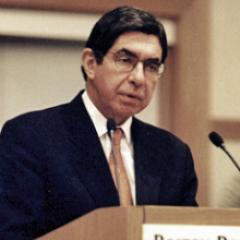Elise Boulding and Randall Forsberg On War and Terrorism
In this follow-up to their Center-published book Abolishing War (1998) Elise Boulding and Randall Forsberg consider ways to consider the multiple dimensions of security in the aftermath of 9/11. Among many topics, they address legal vs. political methods and propose a variety of nonviolent means of bringing about social and political change. Both deplore the increasing sense of moral “numbness” that comes with military action and describe the unique contributions of women to conflict resolution and peace making. Patti Marxsen moderates this August 2002 discussion.
I’m sure we all agree that the world certainly changed dramatically on September 11th. At this point, we need to reconsider what terrorism is, who is defining terrorism in the world today, and what the appropriate response to it should be, both as individuals and as members of political entities. Let’s start with you, Randy, because this line of inquiry does speak to something that you said in Abolishing War. I quote: “Violence is never morally or politically acceptable except when used in defense against its use by others who have not accepted this principle and have initiated acts of violence.” How does global terrorism alter that idea? And does the nature of terrorism call for a new vocabulary and new definitions of “defense,” of “invade,” of “attack”?
FORSBERG: Let me back up and start with the overarching question of what is terrorism and the appropriate response to it, and then come to those specifics. I think it’s appropriate and helpful to think of terrorism as a contemporary form of national wars of liberation. It has a lot in common with those wars, which were more frequent during the previous 100 years than they are today.
Terrorism resembles such wars in that you have parties to a conflict that are very asymmetrical. In the traditional national wars of liberation, you had an imperial power that was much more wealthy and had much more powerful military forces than the people striving for liberation. Typically, you had guerilla forces, which didn’t have heavy armaments and couldn’t stand up in a head-on battle. Instead, they would attack stealthily at times and then try to melt away into the population. Many of the same kinds of questions about the appropriate response to terrorism could be asked about the appropriate response to national wars of liberation. There are some guerilla wars and wars of liberation where people are fighting against their own government in a civil war. But in other cases, it still can be against an imperial or outside power that’s typically an industrial country and most often the United States. Who has the right and the duty to respond, and what is an appropriate form of response when you have very asymmetrical parties to a conflict? This question must be understood in terms of their geographic constitution, their political constitution, their wealth, and the moral issues behind the conflict. Terrorism is typically an instrument of those who are not politically organized as a state, who feel they’ve been oppressed and deprived of their political rights, who are using violence because of that. In this way, terrorism resembles national wars of liberation.
Does the use of terrorism meet your standard for violence as a legitimate form of defense?
FORSBERG: Definitely not.
This is an important question because if groups of people are oppressed, if they are subjected to injustice, they might rightfully experience that oppression or injustice as the equivalent of a military attack.
FORSBERG: When I’ve used the word “defense,” I really mean to say that somebody is shooting at you and you are shooting back to save your life or to save someone else’s life. Being politically oppressed doesn’t fall into the category of being attacked with violence.
PM: And, therefore, it does not justify violence.
FORSBERG: Not in my view. Of course there have been a lot of disagreements about this among people who care a great deal about peace and justice. Many people in the period since World War II have felt that wars of national liberation were just wars and that these wars involved just uses of force. But the kind of distinction and analysis that I’ve tried to put forward in Abolishing War is based on the idea that there are always effective nonviolent means of bringing about political change. It’s not a question of doing nothing, of accepting oppression or resorting to violence. There are other ways.
What are some of those nonviolent strategies?
FORSBERG: In particular, I support the strategic nonviolent action and civilian defense approaches of Gene Sharp, which have been developed specifically for use in conditions of internal oppression. With that approach, people create organized and systematic forms of resistance and noncompliance with a government, including Gandhi-style marches and protests or civilian marches such as we’ve seen in Burma. There can also be acts of sabotage of infrastructure which don’t kill people but make it more difficult to rule. And then there’s mass mobilization, consciousness raising, dialogue with the oppressors. There are a lot of instruments for that.
I think these are better alternatives to wars of national liberation and terrorism, particularly in today’s world. This is something that’s been changing historically; opposing oppression and working for democracy becomes easier and is more rapidly picked up and spread as there is more and more of a global culture supporting democratic values and institutions. We also have a global media culture where people around the world are becoming aware of other places where everybody has equal rights. Naturally, they start thinking that they, too, should have equal rights.
Elise, do you agree with this perspective, this interpretation of terrorism as a kind of national war of liberation?
BOULDING: I would emphasize more that terrorism involves symbolic acts. There is, essentially, a very deep hostility to the way things are and a kind of social desperation at work, the feeling that there is no other way that people are going to listen. I remember so well the stories from Algeria, during the struggle for independence from France (1954-1962), about women bearing a bomb under the all-concealing burkha in order to carry out suicide bombings out of a tremendous sense of desperation. Compared to national wars of liberation, the groups that engage in terrorism are quite small. I think of them more as social movements which have an intense desire to get a message across and find no other way to get the message across.
Does this method of communication, this dramatic violent gesture, work in some sense?
BOULDING: It does if others respond the way we’ve been responding since last September. In other words, I would say that our behavior shows that terrorism works.
Please elaborate.
BOULDING: We have mobilized our armed forces, which have no skills in dealing with terrorism. Our response has been pure force, not a response of dealing with the kinds of issues to which the symbolic acts are calling attention. In responding in this way, we have shown all the things people like least about the United States in an accentuated form. Since we have thrown aside the humanitarian laws of war and are saying that because our cause is just, collateral damage is okay, our response is involving the deaths of thousands and thousands of civilians. We reason that this is okay because the cause is just, which means that we have put ourselves and our country in a role that has no moral legitimacy.
You touched on something that really takes us to another question. In a climate of global terrorism, there seems to be an increasing acceptance of civilian killings as “collateral damage” sustained in our self-defense. What do we do about the moral numbing of the public conscience that goes along with this euphemism?
BOULDING: What we have to do is to clarify all the values of democracy that we think we stand for, and show that when these violent social movements — which is the way I would describe what’s going on rather than use the term “terrorism” — when they come up, the way to deal with them is to address the causes that have led to the violence, to speak to the issues. Again, we’re moving in exactly the opposite direction by cutting back on our education budget and our human services budget and expanding the military budget, getting ready for outer space warfare. We’re acting like hegemonic terrorists.
In the aftermath of September 11th, many people were saying, “This isn’t the time to talk about causes and the Middle East conflict and poverty and sanctions against Iraq. That’s for some other time.” But what you’re saying is, that was the time, and it’s still the time.
BOULDING: It’s still the time, very much the time. There’s just no way we’re going to get past this state of war without a change in awareness of all the underlying causes.
How would Muslims around the world have reacted if we had said, “Let’s have a conference and look at the full complexity of the situation?”
BOULDING: I think they would have responded. I would have specifically invited terrorist leaders into this kind of dialogue, even though it sounds unthinkable. The people who are setting up these schools that are training young terrorists, I would have invited some of those teachers to such a dialogue.
Daisaku Ikeda speaks eloquently to the problem of “moral numbing” in his 2002 peace proposal entitled “The Humanism of the Middle Way: Dawn of Global Civilization.” It seems to be a problem in our modern world, and U.S. foreign policy seems to be exacerbating it. Randy, how would you speak to this issue of the numbing that allows us to justify “collateral damage”?
FORSBERG: The nature of television news, where people report about murders and then turn to the weather, has contributed to this. There’s an underlying numbing in the way that we relate to the world every day, even before you get to wartime situations. And then, of course, the United States is so far from the scene of most incidents of warfare. This is part of the problem too.
I recently went to a public forum organized by a woman whose family was from Afghanistan. In December 2001, she went back with a documentary film crew to meet family members still living there. Nearly everyone in her family had fled to Pakistan and was living in a refugee camp. The part of her family that had previously lived in Kandahar had left the city when they heard that the American attacks were coming because their house was near Taliban headquarters in that city. They had gone to live on a farm and in the middle of the night all 20 people who were there, more than half of them children, were killed as they ran out of their house by American soldiers in helicopters. They were just mowed down on the lawn. It was horrifying to hear of that; there’s absolutely no way that anyone could think that these 10 children were terrorists. These were little children and completely defenseless.
This woman and other people were talking about the need for financial support to the families of civilians who have been killed, especially families left without husbands or brothers, and about the need for rebuilding the infrastructure in Afghanistan. The meeting was sponsored by Amnesty International, which has been working on behalf of women in Afghanistan. They explained that the money that has been promised by the international community has not come through, and they only had enough money for the operating costs of the government for two more months. Among others, the U.S. government isn’t living up to its promises there. All of this made me realize how completely unaware the American public is of the ordinary people in Afghanistan. We have taken it upon ourselves to go in there and conduct a military operation and spend hundreds of millions of dollars on that operation and we haven’t given a second thought to the ordinary citizens in Afghanistan.
It seems that some of the most outspoken and courageous individuals and groups we’ve heard from since September 11th in the Middle East are women. This suggests that women have an important role to play in this situation. What particular sensitivities or skills do women have to offer in keeping the perception of real humanity alive in the midst of military activity and political power games?
BOULDING: The organization Women Living Under Muslim Laws has been operating for some years now to help women who are living under the most repressive conditions. But what I have followed most closely is the women’s groups in places like the Great Lakes region of Africa. What’s happening there is that women from both sides whose husbands have slaughtered each other and whose children have slaughtered each other are sitting down together in order to reestablish relations. “Our country is being destroyed; we have to reestablish relations,” they say.
But first what they’re doing is telling each other their stories. Each person hears the suffering of the other, and they’re all equal in their suffering. At first there is real difficulty in communication, but in those meetings that have been well facilitated — and it takes some skill in facilitating these – things change over time. What happens, eventually, is that the beginnings of empathy appear, the ability to understand that, yes, the other person has suffered. And it’s only when that point is reached that it becomes possible to move toward a consideration of strategies, including how to work through the schools.
A process of joint problem-solving begins because women are able to reach the point of willingness to listen more easily than men. The reason for that is that's their role in life, to put it very basically.
Elise Boulding
One particular project designed by Paula Gutlove of the Institute for Resource and Security Studies (IRSS) specializes in bringing together doctors and teachers and the local courts and having them work together across the divide by addressing how the kids are educated and how healthcare is managed. A process of joint problem-solving begins because women are able to reach the point of willingness to listen more easily than men. The reason for that is that’s their role in life, to put it very basically. Women raise children, listen to their needs, listen to the needs of their families, and then do something about it. This cultural training in listening makes a difference. It’s not that they’re biologically different. It is simply cultural conditioning, which is very valuable. Of course, women can learn not to listen, just as men can learn to listen. We certainly have examples of women who are just as power-hungry as any man.
Do you agree with that, Randy? Is reaching that point of empathy, and women’s ability to bring us to that point, an important piece of this puzzle?
FORSBERG: Definitely I think that it is. I know of activities similar to the ones which Elise has alluded to in the former Yugoslavia and Croatia and Bosnia and even in Serbia. I know a woman who’s on a Truth and Reconciliation Committee that’s going to try to start meeting soon in Serbia. I also have been told that one of the reasons that South Africa was able to reach a relatively peaceful resolution in the end, the final transfer of power, was that there were women on the negotiating teams. One of those women later became the deputy minister of defense in charge of disarmament. What she said was remarkable: With women in the negotiating room, men behave differently; that is, not only do women behave differently, but the presence of women evokes a more responsible and sensitive position on the part of the men. I’ve heard from a number of different people that they would never have made it in these talks in South Africa if it hadn’t been for the women on the negotiating teams.
But in the Middle East and in Afghanistan and, in general, in the Islamic world, the struggle is terribly difficult. These are societies where women have been trying to stand up for themselves and take part in the society and insist on being represented in the government. In fact, there are two different struggles going on, one for a nonviolent and equitable resolution of the larger conflict and then another one just for women’s rights and women being recognized and allowed to contribute to society. Of course, it may well be that in those societies where women have been denied most basic rights, they’re especially well-adapted or culturally trained to being sensitive to intercultural conflicts because of their own personal experience of being oppressed.
Does the way women act and react tell us that we all need to be more aware of the human consequences of terrorism?
FORSBERG: Yes, but awareness isn’t really enough. We must be more aware, but in addition to becoming more sensitive and more aware, there are principles for responding to terrorism that can be added to the idea of looking at the causes and trying to address the causes. For example, we have the newly created International Criminal Court, which was actually created for the purpose of bringing to trial people who commit acts of genocide or gross violence against civilians. Terrorism certainly falls into that category. So one alternative for dealing with al Qaeda would have been, literally, to try to apprehend as many people as possible who were involved in the conflict and take them to the International Criminal Court.
This goes back to the earlier question of how we define our actions: defense, attack, or invade. All internal domestic violence that doesn’t go across borders and isn’t prosecuted primarily by nation-states or organized political entities requires us to think a little bit differently about the appropriate forms of response for preventing violence in the short-term as well as in the long-term. In the case of terrorism, I think the appropriate form is definitely to treat it as a criminal matter because it involves relatively small numbers of people who are acting, not whole factions of populations who are organized to do carry out these acts.
BOULDING: I think that’s a very good point. I would just like to add before we leave this subject that the moral numbing has been going on for a long time in this country. We have never publicly grieved over the nuclear bombing of Hiroshima and Nagasaki. We have simply no sense, as Randy said, of what life is like for people under conditions of war. Because the wars that we have fought have been fought overseas. So we’ve never had the experience that many, many people around the world have had, of our own country being a battlefield. There’s no possibility of understanding what that means. That whole value issue is an enormous challenge to our society.
I wonder if there’s a distinction here or, perhaps, contradictory views. Elise mentioned that the terrorist leaders should be invited to the conference, a point of view which supports restorative justice. And yet Randy is advocating a legal approach within the framework of international law. Could you both elaborate a little bit more about this difference?
FORSBERG: I support the idea that it’s important to have dialogue with people who are engaged in a conflict, even if they have resorted to violence. I guess what I would say is there’s a difference between the people who have planned a specific attack and carried it out on the one hand and the people who are perpetuating this approach, the terrorist approach as a strategy. The specific attacks on the Twin Towers and on the Pentagon were, clearly, terrible criminal acts against civilians and I do think those in positions of responsibility should be held responsible. On the other hand, the people in the Middle East who have organized the suicide bombings are a little bit different because of the scale and because the suicide bomber always dies and is sometimes the only person to die. These small-scale suicide bombings have much more of a voluntary character. They are also part of an ongoing struggle that’s more like a national war of liberation; more like a two-party situation.
As Elise was suggesting earlier, I think al Qaeda is more a symbolic expression of opposition to something which is very general. So the inference I draw from that is, if you have a long-standing ongoing two-party situation where you have two sides of a violent conflict, then I think it’s very appropriate to engage people in dialogue, whether they’ve been conducting ordinary warfare or terrorist warfare. In fact, that’s what happened with the Oslo process where people on the Palestinian side were not a state and had been conducting what you could call acts of terrorism, the Intifada. In contrast, prior to 9/11 there was no ongoing situation of direct conflict that was perceived as such between the United States and al Qaeda over a period of time that would allow us to say that these people constituted a large, well-defined group that was in conflict with the United States over some specific claims. Rather, their opposition was much more general.
I’d like to move to the final question in this cluster, and it’s a big question. As we thought about bringing you both together for another conversation, we were curious to know if, in light of September 11th, there were any statements or views that you expressed in the original Abolishing War dialogue that you would revise in any way. Also, how valid today are the conclusions that you reached during that dialogue? Is there anything that you’d take back?
BOULDING: Well, there isn’t anything I would take back. But I think at that period when we were holding those discussions, I underestimated the “island mentality” of the U.S. That is to say, I underestimated how little Americans understood about the world. They don’t study history, they don’t study languages. There’s no real cultural knowledge or adequate language skills in any of our embassies around the world. There are translators, but that isn’t quite the same. Not knowing everything that’s been happening around the world in terms of wars, suffering, and so on has led to a kind of blindness and deafness that should have been addressed. I’m much more aware now of the 10,000 societies spread across 190 states in the international system and the need for more awareness of different experiences in the world community than I was when we published Abolishing War in 1998. I would have built that awareness much more consciously into my concept of a culture of peace.
Maybe we should take a moment and have you define “a culture of peace,” for those who may read this and yet be unfamiliar with your work.
BOULDING: Peace culture is about ways that people have learned to get along by listening to one another and dealing positively with their differences. In Abolishing War, I define it as a “mosaic of identities, attitudes, values, beliefs, and patterns that lead people to live nurturantly with one another and the Earth itself without the aid of structured power differentials – to deal creatively with their difference and share their resources.” As we were just discussing, women have always known how to create special spaces both in families and in communities for listening and dialogue and resolving differences. Peace culture exists in every society. The challenge for peace activists is to carry on the work of building and strengthening peace culture in whatever setting they find themselves.
Thank you. Randy, it’s your turn to tell us what, if anything, you would change since the original Abolishing War dialogue in 1997.
FORSBERG: It’s not so much that there are things I disagree with as things I would add. Even before the 2001 terrorist attack, it had become increasingly clear that armed conflict in today’s world is going to tend to be a civil war or an internal war, not two major nations fighting each other across a border. I’ve had a growing feeling, which was very much reinforced by 9/11 and the subsequent U.S. policy, that to prevent war we really need to focus on human rights, armed-conflict prevention, and the rule of law. The rule of law is very important in the international community because it communicates that just as everyone is equal before the law within nations so are countries equal before international law and, therefore, cannot take the law into their own hands. We need to apply the same general concept of law and due process in international affairs that we do in domestic affairs. Human rights, armed conflict prevention, and the rule of lawÉ these three principles need to be stressed a lot more than the principle of not using armed force except in defense when you’re looking at these asymmetrical and internal wars. So I would add that general concept.
BOULDING: I strongly agree with that.
You started out by saying that the terrorist activities of al Qaeda might be analogous to a national war of liberation. But, in a way, you qualified that later by saying there’s a real distinction between al Qaeda, which is working on more general issues, and national wars of liberation which focus on specific claims. There seems to be a tendency in the world now for various countries to equate their local situations with the “global war on terrorism” and, in so doing, to justify a military response by reasoning, “We need to take the same response as the Americans to terrorism and we, too, have a right of self-defense.” Do you see a fundamental problem with the rhetoric now that equates these local situations with a global situation?
FORSBERG: Your question harkens back to Elise’s earlier comment that when you have two parties to an ongoing conflict, which is a conflict over political control, it’s important to have a dialogue, to include both sides, and to address the issues in a dialogue. Having a rigid position that whichever one of the parties is already constituted as a formal government has all the rights on its side and the party that isn’t has no rights on its side will only lead to more conflict. There is a need to treat the two parties as more or less equal parties. We see that in many parts of the world but specifically in the Palestinian-Israeli conflict, where even the Bush administration has been forced into ambiguities or uncertainties about the situation. Are the Palestinians really terrorists is this a national war of liberation? There is also a great deal of resentment in Kashmir, understandably, where you have a 50-year old ethnic conflict in which the Indian government rules a largely Muslim part of the world. We also see similar conflicts in parts of Africa where there are large ethnic minorities. In fact, there are quite a few places where there are ethnic minorities that feel that they are being deprived of basic political rights and in some cases are turning to violence.
I think Elise is quite right that in those cases – where there are two local parties disputing political authority, forms of government, and human rights – the effort to end and prevent violence definitely needs to involve measures of dialogue and integration. In contrast, the ideological global fanaticism that was involved in the 9/11 attacks illustrates how al Qaeda has generalized from these specific local cases, even though it, too, has some roots in the Middle East conflict in which a largely Muslim minority doesn’t have political rights. But, obviously, the way in which they’re going about trying to oppose oppression is very different from the methods used in local conflicts.
BOULDING: I think there’s a lot of opportunism on the part of some governments in riding the crest of the “war on terrorism” wave. They’re just using it as a political device to advance their own interests.
Do you think Americans are aware of how we have handed language and justification to oppressive governments all over the world?
FORSBERG: I think that one of the reasons that the American people have supported a “war on terrorism” in opinion polls is not necessarily that they support a physical war, but feel that we need to oppose and resist and ‘do something’ about terrorism. That’s generally agreed. It was very clear in the period from September to November 2001 that many, many people hoped that the U.S. response would focus on apprehending the criminals and bringing them to justice.
To some extent, the Bush Administration has done what you were calling for, Elise, in addressing the source: they have taken a much more active approach on the Palestine-Israel conflict, calling for the creation of a Palestinian state and, at one point, proposing an international conference. Of course, more recently Bush has rejected Arafat as a negotiating partner, a stance which makes progress difficult. But at least the Administration has been going through the motions of trying to bring the two parties together. That was completely lacking before.
BOULDING: But they haven’t given up saying they’re going to invade Iraq.
FORSBERG: That’s true. We have a long way to go.




